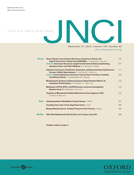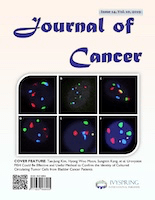
JNCI-Journal of the National Cancer Institute
Scope & Guideline
Elevating the standards of cancer care through scholarly work.
Introduction
Aims and Scopes
- Cancer Epidemiology and Prevention:
Research focusing on the incidence, distribution, and determinants of cancer in populations, with an emphasis on prevention strategies and public health interventions. - Clinical Trials and Therapeutics:
Studies evaluating the efficacy and safety of cancer treatments, including novel therapeutic agents, surgical interventions, and radiotherapy. - Genomics and Molecular Biology:
Exploration of genetic and molecular factors contributing to cancer development and progression, including studies on biomarkers for diagnosis and treatment responses. - Health Disparities and Access to Care:
Investigations into the impact of social determinants on cancer outcomes, addressing disparities in access to care and treatment across different populations. - Patient-Reported Outcomes and Quality of Life:
Research assessing the impact of cancer and its treatments on patients' quality of life, including psychosocial aspects and long-term survivorship issues. - Translational Research and Precision Medicine:
Studies bridging laboratory findings with clinical applications to enhance personalized approaches to cancer prevention, diagnosis, and treatment.
Trending and Emerging
- Integration of Artificial Intelligence in Oncology:
The use of AI and machine learning in cancer diagnosis, treatment planning, and patient management is gaining traction, with studies exploring its potential to enhance clinical outcomes. - Focus on Health Equity and Social Determinants of Health:
Research examining the social, economic, and environmental factors influencing cancer disparities is on the rise, emphasizing the need for equitable healthcare access and intervention. - Longitudinal Studies on Survivorship:
Increasing attention is being given to the long-term effects of cancer and its treatment on survivors, including studies that assess quality of life and ongoing health challenges. - Patient-Centered Care and Shared Decision-Making:
There is a growing emphasis on incorporating patient preferences and experiences into cancer care, promoting shared decision-making processes in treatment options. - Microbiome and Cancer Connections:
Emerging research exploring the relationship between the microbiome and cancer risk, treatment response, and survivorship is becoming more prevalent.
Declining or Waning
- Traditional Chemotherapy Studies:
There has been a noticeable decline in papers solely focused on traditional chemotherapy regimens, as the field increasingly emphasizes targeted and immunotherapy approaches. - Single-Cancer Focus Studies:
Research concentrating exclusively on single types of cancer is waning, with a growing trend towards studies that encompass multiple cancer types or comparative effectiveness across cancers. - Basic Science without Clinical Application:
Basic research studies that do not directly translate into clinical practice or therapeutic implications are becoming less common, as the journal prioritizes translational research.
Similar Journals

Breast Cancer
Connecting global minds to combat breast cancer challenges.Breast Cancer is a prestigious peer-reviewed journal published by SPRINGER JAPAN KK, specializing in the multifaceted domains of oncology and medical pharmacology. With an impressive impact factor and recognized within the Q1 category in multiple areas, including Medicine (miscellaneous), Radiology, and Nuclear Medicine and Imaging, this journal serves as a fundamental resource for cutting-edge research and clinical advancements in breast cancer treatment and care. Its indexed presence in renowned databases like Scopus further affirms its significance, ranking 56th in Radiology and 60th in Pharmacology. The journal aims to bridge the gap between clinical practice and scientific research by publishing original articles, reviews, and case studies that enhance understanding and improve patient outcomes. With converged content available from 1994 to 2024, the journal is dedicated to fostering innovative research while engaging a global audience of researchers, clinicians, and students passionate about tackling breast cancer challenges.

CANCER
Transforming knowledge into healing in the fight against cancer.CANCER, published by Wiley, stands as a pivotal journal in the field of oncology and cancer research, boasting an impressive impact factor and consistently dynamic growth since its inception in 1948. With an ISSN of 0008-543X and an E-ISSN of 1097-0142, this esteemed journal is recognized for its rigorous peer-reviewed articles, making significant contributions to the understanding of cancer biology, treatment modalities, and clinical practices. CANCER holds a distinguished position in the academic community, securing its placement in the Q1 category for both cancer research and oncology, and ranks within the top percentiles on Scopus, indicating its high impact and relevance. The journal is particularly beneficial for researchers, professionals, and students seeking to stay abreast of the latest advancements in cancer science. By addressing essential research questions and providing pathways for new therapies, CANCER continues to play a crucial role in shaping the future of oncology and improving patient outcomes.

Cancers
Exploring the frontiers of cancer biology and therapy.Cancers is a leading peer-reviewed journal published by MDPI, dedicated to advancing the field of oncology and cancer research. Established in 2009 and based in Switzerland, this Open Access journal provides a platform for the rapid dissemination of high-quality research findings, reviews, and clinical studies related to all aspects of cancer biology and treatment. With an impressive impact factor and recognized as Q1 in Oncology and Q2 in Cancer Research for 2023, Cancers strives to foster a collaborative environment among researchers, healthcare professionals, and students seeking to deepen their knowledge and understanding of cancer. The journal’s commitment to accessibility and its broad scope make it an invaluable resource for anyone passionate about combating cancer and improving patient outcomes. For more information and to access its diverse publications, visit the journal’s website.

South Asian Journal of Cancer
Advancing cancer research in South Asia.South Asian Journal of Cancer, published by GEORG THIEME VERLAG KG, is a pivotal platform for research in the fields of oncology and cancer research. Established in 2012 and operating under an Open Access model, this journal aims to disseminate high-quality, peer-reviewed articles that address crucial developments in cancer treatment, prevention, and research, particularly within the South Asian context. Despite its young history, the journal has been positioned within the Q4 quartile for both Cancer Research and Oncology, and while current Scopus rankings indicate it resides in the lower percentiles, its commitment to amplifying regional voices and research is invaluable. With its headquarters in Stuttgart, Germany, and a global readership, South Asian Journal of Cancer is dedicated to enhancing collaboration among researchers, healthcare professionals, and students, fostering a space for innovative ideas and advancements in cancer care as we progress through to 2024.

JOURNAL OF CLINICAL ONCOLOGY
Fostering a community dedicated to advancing cancer knowledge.Journal of Clinical Oncology is a premier academic journal published by Lippincott Williams & Wilkins, dedicated to the field of oncology and cancer research. Since its inception in 1983, this influential journal has consistently ranked in the Q1 category across multiple disciplines, including cancer research, medicine, and oncology, reflecting its critical role in shaping the future of cancer therapeutics and patient care. With a Scopus ranking of #9 in Medicine - Oncology and #6 in Biochemistry, Genetics and Molecular Biology - Cancer Research, Journal of Clinical Oncology publishes cutting-edge original research, reviews, and clinical updates that are essential for professionals, researchers, and students alike. Although it does not currently offer open access options, it provides invaluable insights and evidence-based findings that are crucial for advancing oncological knowledge and improving patient outcomes globally. The journal’s continued commitment to excellence ensures its place as a vital resource in the oncological community.

BMC CANCER is a prestigious, peer-reviewed journal dedicated to advancing the field of cancer research and oncology since its inception in 2001. Published by BMC, a leading name in open-access publishing, this journal plays a crucial role in providing researchers, professionals, and students with a platform for high-quality scientific discourse. With an impressive impact factor, BMC CANCER is ranked in the Q2 quartile across multiple categories, including Cancer Research, Genetics, and Oncology, reflecting its commitment to impactful research and rigorous peer-review standards. The journal ensures broad accessibility to its content through its Open Access model, allowing findings to reach a global audience without financial barriers. The editorial board consists of recognized experts committed to fostering innovation and collaboration within the cancer research community. Researchers working at the intersection of cancer biology, treatment options, and genetic influences will find BMC CANCER an invaluable resource for sharing their findings and engaging with the latest developments in the field.

JCO Global Oncology
Transforming Cancer Discourse WorldwideJCO Global Oncology is a premier open-access journal published by Lippincott Williams & Wilkins, dedicated to the dissemination of high-quality research in the fields of cancer research and oncology. Since its inception in 2020, this journal has rapidly established itself as a vital resource for researchers, healthcare professionals, and students, holding a distinguished position in the Q2 category for both Cancer Research and Oncology based on the latest metrics. With an impressive Scopus rank of #61 out of 636 in General Medicine, the journal is recognized for its rigorous peer-reviewed articles and cutting-edge insights into oncological science. The open-access model ensures that vital research is readily available to a global audience, fostering collaborative advancements in the fight against cancer. JCO Global Oncology explores a broad range of topics and encourages submissions that contribute to the understanding, prevention, and treatment of various malignancies. With its substantial impact and ongoing contributions to the field, it stands as a promising platform for advancing oncological discourse and knowledge.

Journal of the Egyptian National Cancer Institute
Leading the charge in global cancer discourse.Journal of the Egyptian National Cancer Institute, published by SPRINGER, serves as a vital platform for disseminating innovative research in the field of oncology and cancer research. With both ISSN 1110-0362 and E-ISSN 2589-0409, this Open Access journal has been committed to making significant contributions to the scientific community since its inception in 2005. Operating from its base in Egypt, it has established itself as an important resource for researchers, practitioners, and students alike, offering insights into contemporary issues and advancements in cancer care. Recognized in the 2023 category quartiles as Q3 in Cancer Research and Q3 in Oncology, the journal is positioned to impact the ongoing discourse in cancer treatment strategies and health policy. As it continues to publish peer-reviewed articles through available Open Access avenues, the Journal of the Egyptian National Cancer Institute remains dedicated to enhancing the knowledge base and collaborative efforts within the global cancer research community.

BULLETIN DU CANCER
Empowering the fight against cancer through knowledge.BULLETIN DU CANCER is a pivotal academic journal dedicated to the field of oncology, providing a platform for innovative research and insights into cancer treatment and diagnostics. Published by Elsevier Masson, Corp Off in France, this journal has been a part of the scientific community since 1966, and is committed to sharing critical findings that influence clinical practices and improve patient outcomes. Despite its recent rankings placing it in the Q4 category for Cancer Research and Q3 for Hematology and other related fields, BULLETIN DU CANCER remains essential for those interested in the latest developments in cancer biology and treatment methodologies. With an emphasis on both basic and clinical research, it serves as a valuable resource for researchers, healthcare professionals, and students seeking to deepen their understanding in various dimensions of oncology. This journal is particularly relevant as it continues to spotlight emerging research trends and supports the global imperative to combat cancer more effectively.

Journal of Cancer
Advancing oncology through groundbreaking research.Journal of Cancer is a premier, peer-reviewed academic journal published by IVYSPRING INTERNATIONAL PUBLISHING that focuses on advancing the field of oncology. With an impact factor reflecting its significant contributions, this journal ranks in the 80th percentile of medical journals pertaining to oncology, positioning it at #79 out of 404 in Scopus. Since its inception in 2010, the journal has embraced an Open Access model, ensuring that groundbreaking research reaches a global audience without barriers. Based in Australia, the journal addresses a wide array of topics within cancer research, catering to researchers, healthcare professionals, and students committed to enhancing their understanding of the complexities of cancer. Amidst evolving challenges in oncology, the Journal of Cancer serves as a vital platform for disseminating innovative findings, fostering collaboration, and promoting informed decisions that can lead to improved cancer outcomes worldwide.